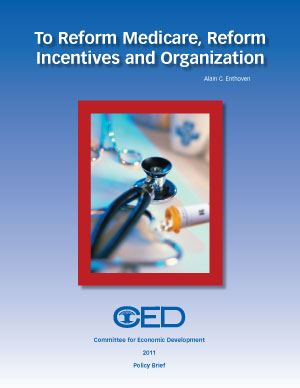To Reform Medicare, Reform Incentives and Organization

-
Publication Date:
November 04, 2011
Alain C. Enthoven’s paper, To Reform Medicare, Reform Incentives And Organization, explains how the principles of cost-responsible consumer choice among competing health-insurance plans, sometimes called “managed competition,” can both improve quality and reduce cost in the federal government’s Medicare program.
Medicare is both the essential “insurer of insurance” for the U.S. elderly population, and by far the most important cause of the long-term crisis in the federal budget. Its role as a cost driver in the budget is indirectly linked to rising cost throughout the U.S. healthcare industry. While its essential function of providing coverage to senior citizens must be fulfilled, its cost growth must be slowed – or else the federal government will be forced to make very painful choices, among which will be reneging on that commitment to our seniors. And ideally, the steps to control its cost growth should contribute to both cost savings and improvements in quality throughout the healthcare system.
Professor Enthoven, who was a pioneer of the concept of managed competition, shows how that concept can be applied to Medicare – which today, though heavily managed in many respects, is largely devoid of competition. The objective is to give insurance plans, healthcare providers and the elderly reasons to seek high quality, efficient health care – which they do not have under today’s largely fee-for-service system. The result should be providers and insurers who see that they can prosper if they deliver quality health care to consumers at attractive prices. Those providers and insurers then will seek every possible way to reduce costs while maintaining and even improving quality – which they have little reason to do now.
-
Complimentary.








